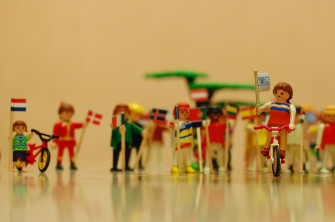
ITF '1995-2011 Spending on Transport Infrastructure Report' and what it means for cycling.
The International Transport Forum (ITF) has just released their 1995-2011 Spending on Transport Infrastructure Report, which presents that OECD countries are spending on average 1% of their annual GDP on transport infrastructure[i]. As the ECF 2020 calls for 10% of this expenditure to be dedicated to cycling how do the numbers start to look after calculating the percentages and what can be done with these numbers?
If the average per annum expenditure is 1% what does this spell in Euros? The EU 27’s (now 28) aggregate GDP for 2012 was roughly €12,928 trillion[ii]. 1% of this amount means that around €129 billion is being spent annually on transport infrastructure for the whole Union.
One of the ECF’s target goals for 2020 is to make sure that the EU and nations are dedicating 10% of their yearly transport budgets to cycling. Therefore, € 12.9 billion represents the gross amount of the EU 27 GDP that should be spent yearly on cycling by 2020. This is based on the ITF’s 1% calculation and applies to collective national GDPs not the EU itself.
At the European level, the ECF has already begun our €6 Billion Campaign which takes the 10% figure and asks the EU to set aside €6 Billion of the 2014-2020 budget for cycling infrastructures. In other words, the EU should invest €1 billion a year into cycling. This means that the EU nations need to spend around €12.3 collectively per annum themselves[iii].
If nations have hesitations to invest further in cycling, the returns make it well worth their time. The popular examples like cycling is environmentally friendly, creates a healthier population, and promotes cycle tourism all produce staggering economic returns. This piece from the London School of Economics demonstrates some aspects of cycling’s impact on the economy.
As we progress towards 2020’s 10% goal, the ITF’s report will help serve a guide for governments, NGOs and other organizations who want to see the hard numbers in order to better inform their plans. By understanding how much is being spent, why it’s being spent, and in which aspects of transport it is being spent, we as cyclists can organize and prepare our plans and visions better. The fact is, some organizations do not have the capacity or reach to know who to ask for money, how much to ask for, or how to ask for it. If you want to find out how to have the EU allocate €6 billion for cycling see our plan here.
In times of austerity like now, it is important not to forget that cycling is an investment that gives back. Hopefully, by seeing the amounts that are being spent in transport the connections can be made that building a cycling infrastructure, educating new and old cyclists, and promoting the activity comes at a low cost comparatively and substantially gives back economically, environmentally, and physically. Hopefully, this will encourage more to take action or at least know how to better their current projects and proposals.
You can read the whole ITF Report here
[i] 1% average for all OECD. 1% average for Western European Countries and 2% average for Central and Eastern European Countries.
[iii] This number is the gross total for all EU Member States. Actual expenditure will vary greatly from country to country but all will have to dedicate 10% of transport expenditure.
About the Author
Gregory Markus is a Communications Assistant at the ECF. He just received his Masters in European Studies from the University of Amsterdam. He currently lives in Amsterdam and is learning how to ride his bike no-handed.
- See more at: http://ecf.com/news/rtf-recognizes-importance-of-speedlimits/#sthash.Ax4...
About the Author
Gregory Markus is a Communications Assistant at the ECF. He just received his Masters in European Studies from the University of Amsterdam. He currently lives in Amsterdam and is learning how to ride his bike no-handed.
- Log in to post comments
Contact the author
Recent news!
Upcoming events
Contact Us
Avenue des Arts, 7-8
Postal address: Rue de la Charité, 22
1210 Brussels, Belgium










